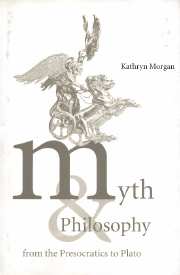Book contents
- Frontmatter
- Contents
- Acknowledgements
- 1 Introduction
- 2 Theoretical issues
- 3 Some Presocratics
- 4 The sophists and their contemporaries
- 5 The Protagoras: Platonic myth in the making
- 6 The range of Platonic myth
- 7 Plato: myth and the soul
- 8 Plato: myth and theory
- 9 Conclusion
- Bibliography
- Index of passages cited
- General index
4 - The sophists and their contemporaries
Published online by Cambridge University Press: 22 September 2009
- Frontmatter
- Contents
- Acknowledgements
- 1 Introduction
- 2 Theoretical issues
- 3 Some Presocratics
- 4 The sophists and their contemporaries
- 5 The Protagoras: Platonic myth in the making
- 6 The range of Platonic myth
- 7 Plato: myth and the soul
- 8 Plato: myth and theory
- 9 Conclusion
- Bibliography
- Index of passages cited
- General index
Summary
INTRODUCTION
The Presocratics fashioned themselves by challenging the authority through which the poets constructed their discourse. The generation of multiple poetic versions of myths according to no verifiable criterion was, for them, symptomatic of careless intellect. Poetic myths had enshrined unexamined cultural conventions and governed education. The Presocratics treated here responded by creating myths and mythological characters that were responsible to ‘scientific’ criteria of truth and falsity and reflected potential problems in the application of these criteria. Concerns with the status of myth and poetry were closely connected with questions about the nature and efficacy of language, and myth was used to encapsulate these questions. The language of myth, was not, then expunged from philosophical vocabulary, but its reference was changed. We might call this attitude to myth ‘transformative’. I shall call the approach of the sophists and their contemporaries towards myth ‘appropriative’, since the traditional stories retain their old forms and are manipulated rather than questioned. As we turn to the second half of the fifth century, we find that the same concerns inform intellectual speculation: the nature and power of language, and the status of the poets and their myths. The context of the speculation is different, however. Athens has become the intellectual centre ofthe Greek world. The rise of the Athenian empire and of developed democracy entailed greater opportunities for political and financial gain for citizens who aspired to positions of influence.
- Type
- Chapter
- Information
- Myth and Philosophy from the Presocratics to Plato , pp. 89 - 131Publisher: Cambridge University PressPrint publication year: 2000



